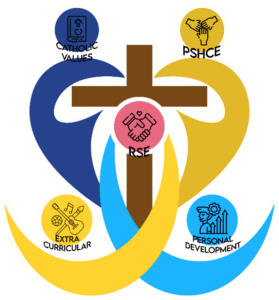‘An education in the fullness of humanity should be the defining feature of a Catholic School’ ~ Pope Francis
Our Personal Development programme covers 5 key strands. These are:
Strand 1: PSHCE
Strand 2: RSE
Strand 3: Personal Development Lessons
Strand 4: Catholic Virtues
Strand 5: Extra-Curricular
Please click on the The Personal Development Menu on the right hand side to access relevant information in the five strands.
The topics link at the top, outlines how PSHCE, RSE, Personal Development and Catholic Virtues contribute to our programme
The aim of the Personal Development programme at The Becket School is to enable and encourage all of our students to acquire the skills, understanding and key knowledge they need to thrive as individuals in all aspects of their lives and to become active and responsible citizens who can contribute to our society – as Pope Francis describes it, “an education in the fullness of humanity”.
At the centre of all that we do as a faith community, is the understanding that each human person is made in the image and likeness of God. Our curriculum therefore, underpins the Catholic ethos and Mission of the school and is a catalyst for the School’s principal role of teaching our students to grow and flourish so they may live life in all its fullness and serve as valued contributors to our society.

In John’s Gospel, Jesus expresses the aim of life is a life of fullness (human flourishment). In order to ensure you are equipped to live life to the full, to reach your full potential and flourish into your ultimate purpose, we have created a Personal Development programme which will encompass Personal, Social, Health, Citizenship Education (PSHCE) and Relationship and Sex Education (RSE). The programme also covers Catholic virtues and your extra curricular contribution and involvement.
Personal Development lessons will deal with real-life issues that affect all of us, our families and communities. This will all be done with a full understanding of our faith character and our lessons, in particular our Relationships and Sex Education, will be presented in accordance with the Church’s moral teaching.
To get the most out of your Personal Development lessons it is important that you listen, engage, get involved in class discussions and follow the ‘ground rules’ that will be established in your Personal Development classroom. There will be opportunities to ask questions (both publicly and privately if you prefer) and your teacher will support you through the programme.
“I have come so that they may have life, life in all its fullness” John 10:10
“I have come so that they may have life, life in all its fullness” John 10:10
Jesus’ words in John’s Gospel express the aim of human life as ‘human flourishing’ (Eudaimonia). Our whole business in this life is to flourish by seeking to form our character through the pursuit of personal strengths called virtues: excellences of character which are theological, moral, civic, intellectual and performative. Therefore, if we can aid the character development of our young people we can help them to flourish.
A virtue is a behaviour that shows high moral standards; someone who is virtuous is someone who behaves in a way that knows right from wrong. The bible asks us to try our best to “add virtue to our faith” and the Catholic Church mentions four in particular: temperance (self-control), justice (knowing right and wrong), prudence (wisdom) and fortitude (bravery in tough/painful moments). We are asked to make these virtues part of our character (the qualities of a person that make them who they are). When people describe us, our aim should be for them to say things like ‘resilient’, ‘disciplined’, ‘wise’ and ‘know what is right and wrong’ rather than ‘popular’, ‘lazy’ or ‘rich’.
So how can do we add virtues to our character? A 19th century psychologists put it like this: “All our life…. Is but a mass of habits….bearing us irresistibly towards our destiny.” (William James) What he meant was that our characters are shaped by our habits. We become what our habits are. What is a habit? A habit is behaviour we repeat again and again without thinking (e.g. saying please/thank you). Once something is a habit, it becomes a part of who we are – our character. Hopefully, our habits will be good ones so that we develop virtuous characters: “Virtue is what happens when wise and courageous choices become second nature.” (Theologian N. T. Wright). One Church leader describes this really well: “There are no magic pills. There are no shortcuts. Discipleship is like any other good thing that’s worth doing, be it learning a language, or getting in shape; we grow as disciples in small steps, a day at a time, over months and years.” (Mike Cosper) It can be hard to form new good habits and stop bad habits – it takes self-control and self-discipline. Teachers can help to shape good habits and challenge bad habits (e.g. through warnings, detentions, conduct card etc)
Virtues Curriculum – The Becket Way
Year 7
Theological Virtues – Faith, Hope, Charity [Love]
Year 8
Temperance
Year 9
Prudence
Year 10
Justice
Year 11
Fortitude
“I have come so that they may have life, life in all its fullness” John 10:10







